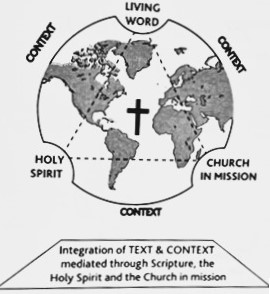
St Paul’s Narrative Statement of Identity: We love to be together, persevere, and practice the ways of Jesus together. Even though we’re at different places on our journey, we share a guiding story as given through the Bible, and we all look for Jesus in each other and in the world we live in. We share faith, we share music, we share differences, and above all we share God’s love of us in Jesus. We all give, we all receive. We are a diverse family who laughs, cries, and prays together, and is learning how to love and care for each other. Our greatest ambition is to share this love with everyone around us – in our neighbourhoods and around the world.
St Paul’s Visioning
This is an opportunity for us to assess our parish in terms of where we currently are at. As we look to the future, it is important for us think clearly where we currently are so that we can plan to take steps to grow into the future God has for us. We are going to do this assessment in terms of 5 broad categories that are important for the “proper functioning” of a local expression of the Body of Christ. The assumption here is that a properly functioning parish has a clear mission that they are fulfilling as they carry out the work of the kingdom of God in the parish, in its community, and in the world. These 5 categories are areas of accountability for us as we plan for the future at St Paul’s.
- Stewardship (p. 82): Our Narrative Statement of Identity (NSID) speaks about St Paul’s being a sharing community. Traditionally, we think of this in terms of our accountability in the three T’s: Time, Treasure, and Talent. Christians are not owners, but stewards, as God is the creator of all that is and all we have is God’s. So we must also keep in mind that this area includes environmental accountability as well; i.e., how well are we stewarding God’s creation? Do we “safeguard the integrity of creation and sustain and renew the life of the earth” (the 5th Mark of Mission)? Here Time means the time that parishioners use to serve in the mission of the parish. Talent refers to the gifts and talents parishioners have that they use to serve the mission of the parish. Treasure means church facilities, equipment, and finances.
When St Paul’s is functioning properly our members use their possessions, their resources, and their goods (3 T’s) to serve the mission of the Parish, and the Parish uses these resources and financial assets maximally to carry their mission. - Text-Context (p. 96): Another key aspect of a properly functioning parish is that Scripture is taught and lived out in appropriate ways in the local and global community. Our NSID identifies this in terms of our commitment to a common story as given in the Scriptures. However, this requires not only that we know the Scriptures but that we also understand our cultural context. So the proper functioning parish will not only study, meditate on, and listen to God’s Word in Holy Scripture, they will also listen to people in their neighbourhoods, build relationships with them, and understand people’s motivations, problems, dreams, and values in such a way that they can meet them with the Gospel where they are and explain how the Gospel addresses their deepest needs. That is, when a parish is functioning properly it has an integration of text and context that is mediated through Scripture, the Holy Spirit, and the Church in mission.
 When St Paul’s is functioning properly we understand our context (vis-à-vis its cultural, religious, economic, geographical, and social aspects) and we know how to communicate God’s Word in ways that make sense within it.
When St Paul’s is functioning properly we understand our context (vis-à-vis its cultural, religious, economic, geographical, and social aspects) and we know how to communicate God’s Word in ways that make sense within it. - Witness (p. 121): Our NSID identifies our greatest passion as sharing God’s love with everyone around us – in our neighbourhoods and the world. A key part of our functioning properly as a parish will be that we do this by telling people about God’s love for them in Jesus and by showing them this love in concrete ways that address their needs. The point in this is not to “grow the church.” Only God grows the church. The point is that this is what we do out of the overflow of God’s love in and to us; it is what we cannot not do! But we are, as we say, “guided by a common story” and we think this story is the best news of all – for everyone! And so we make sense of how we act in the world by sharing the story of God’s love for us all in in Jesus’.
As we do this, it may be helpful to remember David Fitch’s three circles of church engagement (from Faithful Presence): the Close Circle, where we gather together as God’s people and receive from God (God is the host); the Dotted Circle, where we gather in homes and small groups in our own spaces and bring the church out into the community through soup kitchens etc. (we are the hosts); and the Half Circle, where we meet our neighbours in the marketplace and neighbourhood spaces (we are the guests), where we bring God’s presence to the marginalized and hurting. Here we don’t force our way or insist on our way, but come as servants. The question here, as Fitch puts it is “not whether Christ is here or not. Rather it is whether his presence will be welcomed.”
This perspective thinks of Christian identity and parishes as comprising centred sets versus bounded sets. Bounded sets are closed systems, whereas centred sets are open systems. When we think of our identities and our parishes as bounded sets we are very concerned to establish the boundaries of our “set” – of what comprises our identity. This is important to us, on this perspective, because if we do not do that, we will not know who is “in” and who is “out”; more importantly, we will not know if we are in or out! However, when we approach our identities as centred sets our concern is not with the boundaries of what makes us who we are, but with the centre. Everything else is then thought of in relation to that centre. For Christians, the centre of our identity is Jesus Christ. For our parishes, I believe it is the Eucharistic table where we gather around God’s Word and the sacrament to meet with Jesus and to learn how to love each other and share the gifts God ahs given us. This is how Fitch’s circles operate.
When St Paul’s is functioning properly we announce the Good News of Jesus Christ in word and in deed and invite people to be a part of the Kingdom of God. - Compassionate Service (p. 147): As we continue to fulfill our NSID as people shaped by God’s love, we cannot not meet people needs in the name of Jesus, showing them Christ’s love. Ephesians 4 describes the Church as an organic body that is gifted by the Holy Spirit to serve each other and world. And one of Paul’s favorite descriptions of Christians is as douloi: slaves or indentured servants. The picture we get of the parish, then, is that it is the gathering in a particular place of people who are completely committed to serve God’s purposes in the world – which means the people around us. When we are functioning properly as a parish, we do not simply have programs and initiatives to tell people about Jesus, we show them in concrete ways that God loves them as we use the gifts the Holy Spirit gives us at Baptism in loving acts of service. We do this by finding out what people really need and focusing our initiatives in our neighbourhoods on serving people with those needs (vs. getting them to attend our church or believe the way we do). We help people understand what we say about God by showing them who God is through our acts of service to the world and each other.
When St Paul’s is functioning properly we meet people’s needs in the name of Jesus and invite them to follow of Jesus with us. - Caring and Welcoming Community (p. 167): Finally, in our NSID we aspire to be “a diverse family who laughs, cries, and prays together, and is learning how to love and care for each other” and to “share differences” in a way that does not hinder, but rather strengthens our bonds of community and the love we have in Jesus. This is a deeply biblical function of the Body of Christ and one that is essential to properly functioning parishes. As Paul says in 2Corinthians 5, Christians are given the “ministry of reconciliation” whereby we participate in God’s reconciliation of the world in Jesus Christ. To be a Christian is to follow Jesus with other people and to welcome the stranger and those who are hurting and broken and to be a reconciling presence in the world. We have to be sensitive to the ways in which certain populations have been systemically discriminated against, and are at risk and are actively harmed in our society and in our churches. We need, then, to be the sort of community in which a diversity of people feel welcome and cared for and that is safe for all people to experience God’s love of them in Jesus and to grow in the knowledge and grace of our Lord Jesus Christ.
When St Paul’s is functioning properly we will show the love and compassion of Christ as we welcome and care for all people and each person in our community help will with each other’s burdens.
.JPG)
